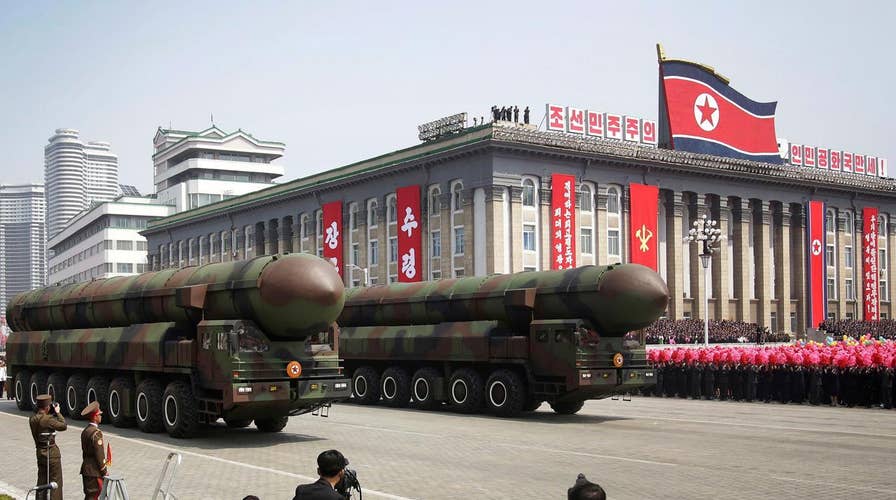US emerging as the leader in taking on the North Korea threat?
Hoover Institution Research Fellow Kiron Skinner on efforts to stop the mounting threat from North Korea.
Listen to the mainstream media and President Trump’s national security adviser, H.R. McMaster, and you would conclude that war on the Korean Peninsula is imminent, right?
You’d be wrong. The only way a war breaks out in Northeast Asia is if Washington starts it. Let me tell you why.
The 50-year war between North Korea and its neighbor South Korea is over. North Korea lost. Dictator Kim Jong Un now presides over a dying society in the North – a prison camp full of about 25 million miserable, starving people masquerading as a country. North Korea lags in economic terms somewhere behind Ethiopia.
In contrast, South Korea is an economic juggernaut; a nation of roughly 51 million with an economy larger than that of Russia, which has a population of about 144 million. In terms of per capita gross domestic product, South Korea ranks 31st in the world, while Russia ranks 68th and North Korea ranks nowhere.
Kim’s armed forces mirror his society’s tragic condition. They are an aging tribute to the Soviet forces of the 1970s. Any attempt to employ them against South Korea’s modern armed forces would end in devastating defeat for North Korea.
Kim also knows that missile attacks launched from his soil against the South Korea, Japan or the United States would result in the immediate and total destruction of his Stalinist regime.
Chinese President Xi Jinping has told Kim in very clear terms that if Kim launches an attack on his neighbors or the United States, he is on his own. The Chinese armed forces will stand by and watch as Kim’s regime is systematically annihilated.
To reiterate, the only way war breaks out in Northeast Asia is if the United States starts it. And this insight explains Kim’s strategy. His best chance of survival is to goad President Trump into attacking him. Then Beijing – despite the Chinese distaste for their North Korean neighbor – will be obligated to intervene to defend Kim’s regime.
With this point in mind, Kim has turned to Moscow, not Beijing, for help. Moscow sees Washington’s renewed interest in bringing down Kim as an opportunity. From Moscow’s perspective, North Korea is useful insofar as it can be leveraged in a high-stakes game to bring Washington into conflict with not only North Korea, but more importantly with China.
While China will not support North Korea in a war unleashed by the Kim regime, Beijing has said the Chinese Armed Forces will assist Kim if Washington attacks North Korea.
To promote conflict with China – something President Trump made less likely with his wise diplomacy toward China – Moscow is willing to provide just enough technical assistance to create the illusion of capability in North Korea.
The North’s recent missile launch is a case in point. The liquid-fueled rocket that North Korea launched into space recently lacked precision guidance, as well as a viable warhead. And, like its predecessors, the rocket broke up on reentry and crashed in pieces into the sea.
South Korean President Moon Jae-in summed up the 50-minute rocket test by saying it was not clear “whether the communist nation has in fact built nuclear weapons, let alone perfected its missile technology.”
For Washington, the right course of action is obvious. Don’t take the bait. As former Secretary of Defense Bob Gates warned some time ago: "Any future defense secretary who advises the president to again send a big American land army into Asia or into the Middle East or Africa should have his head examined.”
The sole beneficiary of a conflict between the United States and China is Russia.
Like Serbia in 1914, North Korea is unpopular with virtually every nation in the world, including China. On the eve of World War I, the Guardian newspaper noted sarcastically that “if it were physically possible for Serbia to be towed out to sea and sunk there, the air of Europe would at once seem cleaner.” Most of the world would readily apply this description to North Korea.
Of course, in 1914 not a single European statesman regarded Serbia as a country so important that every major power in Europe – and eventually the world – would go to war over its future. Yet, thanks to Russia’s decision to mobilize its armies and back Serbia, that’s exactly what happened.
My advice to President Trump is simple: Mr. President, Moscow is inciting Rocket Man. Don’t take the bait.
Retired Army Col. Douglas Macgregor is a decorated combat veteran, a Ph.D. and the author of five books; his most recent is Margin of Victory (Naval Institute Press, 2016).

